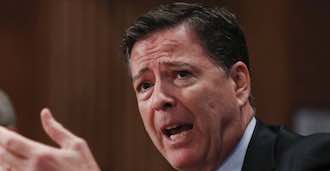By Robert Laurie ——Bio and Archives--July 10, 2017
American Politics, News | CFP Comments | Reader Friendly | Subscribe | Email Us
 As you'll no doubt recall, during former FBI Director James Comey's congressional testimony he claimed that he “understood" his memos to be nothing more than his "recollection recorded of my conversation with the president." Comey said that, "As a private citizen," he thought it was "important to get it out.” So, he decided to leak at least one of his memos to the press.
Unfortunately for Comey, a new report at The Hill indicates that there were seven of these "personal memos." Of them, four contained classified material, and ALL of them were "government documents." As such, their removal is a direct violation of 18 USC 1924, which forbids the "Unauthorized removal and retention of classified documents or material."
As you'll no doubt recall, during former FBI Director James Comey's congressional testimony he claimed that he “understood" his memos to be nothing more than his "recollection recorded of my conversation with the president." Comey said that, "As a private citizen," he thought it was "important to get it out.” So, he decided to leak at least one of his memos to the press.
Unfortunately for Comey, a new report at The Hill indicates that there were seven of these "personal memos." Of them, four contained classified material, and ALL of them were "government documents." As such, their removal is a direct violation of 18 USC 1924, which forbids the "Unauthorized removal and retention of classified documents or material."
More than half of the memos former FBI chief James Comey wrote as personal recollections of his conversations with President Trump about the Russia investigation have been determined to contain classified information, according to interviews with officials familiar with the documents.
This revelation raises the possibility that Comey broke his own agency’s rules and ignored the same security protocol that he publicly criticized Hillary Clinton for in the waning days of the 2016 presidential election. Comey testified last month he considered the memos to be personal documents and that he shared at least one of them with a Columbia University lawyer friend. He asked that lawyer to leak information from one memo to the news media in hopes of increasing pressure to get a special prosecutor named in the Russia case after Comey was fired as FBI director.Which memos were leaked will be key. So far no one knows if the memo he gave to his friend bore classification markings. If it did, his admittedly intentional leak may actually have violated more than one Espionage Act statute.
When the seven memos Comey wrote regarding his nine conversations with Trump about Russia earlier this year were shown to Congress in recent days, the FBI claimed all were, in fact, deemed to be government documents. While the Comey memos have been previously reported, this is the first time there has been a number connected to the amount of the memos the ex-FBI chief wrote. Four of the memos had markings making clear they contained information classified at the “secret” or “confidential” level, according to officials directly familiar with the matter.
Comey indicated in his testimony the memos were in his possession when he left the bureau, leaving him in a position to leak one of them through his lawyer friend to the media. But he testified that he has since turned them over to Robert Mueller, a former FBI chief and now spearheading the investigation about possible collusion between the Trump campaign and Russia. It is not clear whether Comey as director signed the same agreement as his agents, but the contract is considered the official policy of the bureau. It was also unclear when the documents were shown to Congress whether the information deemed "secret" or "confidential" was classified at the time Comey wrote the memos or determined so afterwards, the sources said.
Support Canada Free Press

View Comments
Robert Laurie’s column is distributed by HermanCain.com, which can be found at HermanCain.com
Be sure to “like” Robert Laurie over on Facebook and follow him on Twitter. You’ll be glad you did.